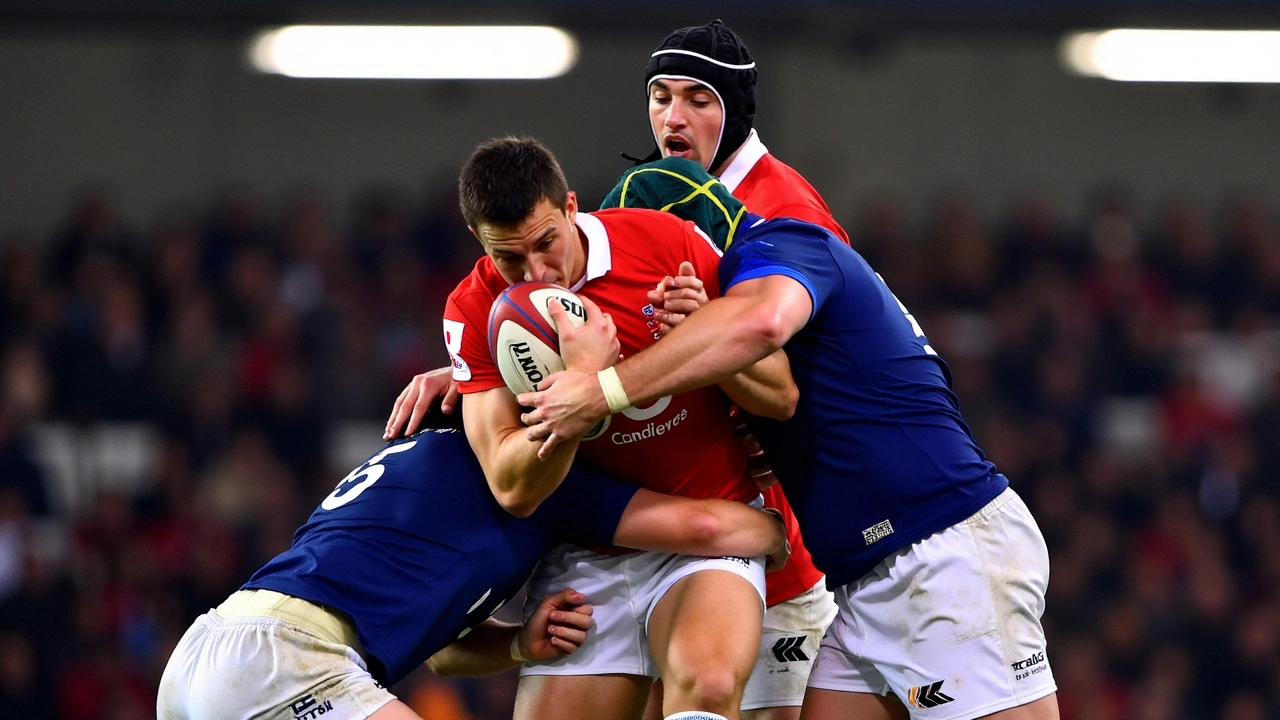The 2025 Six Nations Championship is on the horizon, and rugby fans around the globe are gearing up for what promises to be a riveting tournament. Spanning from January 31 to March 15, the championship features six of Europe's powerhouse national rugby teams: England, France, Ireland, Italy, Scotland, and Wales. This year's tournament, also known as the Guinness Men's Six Nations, continues the tradition of a round-robin format. Over the course of the tournament, each team faces their counterparts once aiming to either dethrone the champions or cement their supremacy. With stakes high and national pride on the line, the Six Nations is more than just a 45-day sporting event; it’s a showcase of grit, strategy, and sportsmanship.
Champions in the Spotlight: Ireland's Title Defense
Ireland steps into the 2025 competition with a particular glint of confidence. Their status as the reigning champions will undoubtedly make them the team to watch. Having secured back-to-back titles, they have established a solid rhythm under the guidance of coach Simon Easterby and the leadership of captain Caelan Doris. Their consistency and ability to perform under pressure have placed them on a pedestal, and they begin the tournament with the coveted second position in the World Rugby Rankings. Yet, as history has shown, the path to victory in the Six Nations is never straightforward. As Ireland prepares to face formidable opponents, they will rely heavily on their tactical prowess and the cohesion of their team dynamics.
France Returns to the Stade de France
An intriguing storyline heading into the tournament is France's return to their home ground, the Stade de France. After a year away due to preparations for the 2024 Summer Olympics, the French team is eager to reclaim their fortress. Historically one of the most vibrant and passionate rugby nations, France is helmed by coach Fabien Galthié and led on the field by the charismatic Antoine Dupont. Their ranking as fourth in the world further underscores their potential to claim victory. Hosting the opening match against Wales on January 31, the French squad will look to captivate their home crowd with a blend of flair and tenacity.

England: New Strategies and Key Players
England, a perennial favorite in the Six Nations, is coming into the tournament under the strategic eye of coach Steve Borthwick. The team will be captained by the formidable Maro Itoje. Despite being positioned seventh in the World Rugby Rankings, England possesses the blend of talent needed to disrupt the predictions. The Six Nations format will require them to face the reigning champions, Ireland, on February 1, an encounter that is expected to be a highlight of Round 1. As England contemplates their strategic approach and seeks to maximize their strengths, they must navigate the challenges posed by the other nations with combined efforts in defense and attack.
Scotland: Embracing the Underdog Spirit
Scotland finds itself entering the fray with a sense of opportunity. Positioned sixth in the World Rugby Rankings, they are poised to leverage their underdog status. Coach Gregor Townsend is tasked with steering the national team forward, with leadership shared between captains Rory Darge and Finn Russell. The Scottish squad has consistently amazed fans with their flair and fighting spirit on multiple occasions, making them unpredictable and exciting opponents. They kick-off their campaign against Italy on February 1, setting the stage for a potential drive up the standings, with each match offering further insight into their evolving strategies.

Italy and Wales: Building Upon Past Performances
Italy and Wales represent the ying and yang of the tournament. Italy sits tenth in the World Rugby Rankings, a testament to their growing strength and commitment to the sport. Under the guidance of coach Gonzalo Quesada and led by captain Michele Lamaro, Italy’s sport is characterized by passionate play and relentless effort. On the other hand, Wales, ranked eleventh, are aiming to blend fresh blood with their experienced campaigners. Veteran coach Warren Gatland continues to shape Wales into a team capable of executing grand plans, while captain Jac Morgan will attempt to bring the best out of his teammates on the field. The respective journeys of Italy and Wales will be vital to observe as they look to challenge their higher-ranked opponents while accruing valuable experience.
Reflecting on the Tournament Schedule
The championship schedule is packed with captivating matchups that stretch the competitive spirit of every team. After the initial Round 1 fixtures, February 8 stands as a day of intense rugby battles with a second round featuring England meeting France, Italy opposing Ireland, and Scotland locking horns with Wales. Such encounters are crucial as teams look to position themselves advantageously for the final standings. February 22 and March 8 continue the momentum with subsequent rounds that promise dramatic ups and downs in terms of results. The climax on March 15 has a set of exciting fixtures like Italy versus Ireland and Wales against England, alongside an engaging duel between France and Scotland. These matches will no doubt influence the finale matrix and possibly the championship's outcome itself.
The 2025 Six Nations offers more than just the thrill of the game. It presents a cherished touchpoint for fans, players, and nations to rally around their colors, sharing emotions as the grand narrative unfolds. The anticipation is palpable, and the stakes are as high as ever, ensuring that this historic competition will see new chapters written with each passing matchday. As preparations draw to a close and the first whistle seems ever closer, enthusiasm will surely echo among seas of voices and heartfelt cheer on this prestigious stage.


Comments (12)
Wow the Six Nations lineup looks 🔥 this year! Can't wait to see Ireland trying to defend their crown, especially with that new captain vibe. The French home crowd at Stade de France will be massive, and I'm sure Dupont's flair will light up the stadium. England's new strategies under Borthwick could shake things up – those forwards look hungry. Scotland's underdog energy might just surprise Italy in round one. And let's not forget the Welsh fans bringing the chants back after a tough season. It's gonna be a roller‑coaster of tries, scrums, and pure passion. Grab your jersey, set the alarm for Jan 31, and enjoy the rugby madness! 🏉😎
Honestly, the way some folks hype up the Six Nations these days feels like blind patriotism on steroids. Sure, the games are thrilling, but glorifying national superiority with reckless fervor just fuels division. Remember that sport is about unity, not an arena for jingoistic posturing. If we keep treating matches as battles for cultural dominance, we lose sight of the genuine love for rugby. Let's enjoy the sport for its skill, not as a stage for ego‑inflated nationalism.
The upcoming 2025 Six Nations offers a fascinating case study in how historical momentum and strategic adaptation intersect on the international stage. Ireland, entering as defending champions, benefit from a continuity of leadership that can translate into robust on‑field cohesion, yet they must guard against complacency that often shadows sustained success. France's return to the Stade de France introduces a psychological variable; playing on home soil can amplify confidence but also elevate expectations to a potentially paralyzing degree. England's recalibrated tactics under Borthwick suggest a willingness to deviate from traditional set‑piece reliance, opting instead for a more fluid back‑line strategy aimed at exploiting gaps in opponent defenses. Scotland, positioned as the underdog, may utilize their sixth‑place ranking to adopt a high‑risk, high‑reward approach, leveraging surprising flair to destabilize higher‑ranked teams. Italy's gradual ascent in the rankings reflects a long‑term investment in youth development, hinting that their match against Ireland could serve as a litmus test for future competitiveness. Wales, balancing experience with fresh talent, appears poised to employ a hybrid model that merges structured play with opportunistic acceleration. The schedule itself is constructed to intensify rivalry clusters-February 8, for instance, packs England versus France, Italy versus Ireland, and Scotland versus Wales, creating a pivotal triad of outcomes that will shape the middle phase of the tournament. From a tactical analytics perspective, the clustering of high‑stakes fixtures demands optimal player rotation to mitigate fatigue while preserving peak performance. Moreover, the March 15 climactic round, featuring Italy versus Ireland and Wales versus England, underscores the tournament's design to culminate in decisive, narrative‑rich encounters. Observers should also note the broader sociocultural implications: the Six Nations continues to act as a conduit for national identity expression, yet the modern discourse increasingly emphasizes sportsmanship and cross‑cultural appreciation over antagonistic rivalry. In sum, the 2025 edition promises a layered tapestry of strategic depth, historical resonance, and evolving player dynamics, making it a compelling subject for both casual fans and rigorous rugby scholars alike.
Can't wait for the opening match.
Totally pumped for the Six Nations! The teams are stacked and the fixtures look tight. Ireland defending, France back home-awesome stuff. England’s new game plan could be a game‑changer. Scotland’s underdog vibe always brings fire. Let’s see who lifts the trophy at the end!
The schedule appears meticulously arranged to balance competitive equity with traditional rivalries. It is noteworthy that the tournament maintains its historic round‑robin format, ensuring each nation contends with every opponent precisely once. Such structure promotes a comprehensive assessment of each side’s capabilities across varied conditions and venues. Consequently, the final standings will reflect a genuine meritocracy rather than the vicissitudes of a knockout system.
Look, I love a good underdog story, but let's be real-some teams are just not ready for the elite level yet. Italy and Wales have the heart, but they need more than passion to topple the powerhouses. Still, you never know; a single breakthrough try can change everything. Keep your eyes peeled, because the spectacle will be worth every second.
From a performance‑optimization standpoint, the Six Nations serves as a live testbed for advanced analytics integration. Teams employing predictive modeling for breakdown efficiency can gain marginal gains that compound over the tournament duration. Leveraging machine‑learning‑driven player load monitoring ensures optimal conditioning while minimizing injury risk. The convergence of data science and traditional coaching philosophies will likely be a decisive factor in 2025.
Having followed the Six Nations for years, I find the evolving narratives each season to be a testament to rugby’s enduring allure. The interplay between heritage and innovation reflects a sport that honors its roots while embracing modernity. For instance, Ireland’s methodical approach showcases disciplined execution, whereas France’s emphasis on creative flair underscores the artistic side of the game. England’s strategic recalibration hints at a willingness to adapt, and Scotland’s underdog mentality brings a guerrilla‑war element that can upset expectations. Meanwhile, Italy’s gradual ascent demonstrates how sustained investment in grassroots programs can bear fruit on the international stage, while Wales continues to balance seasoned veterans with emerging talent, creating a dynamic roster capable of surprise performances. The schedule’s design, with its clustered high‑stakes fixtures, intensifies the drama and forces teams to manage squad rotation meticulously. Fans, too, benefit from this structure, as each round delivers fresh storylines and heightened stakes. Ultimately, the Six Nations remains a crucible where national pride, tactical ingenuity, and player resilience converge, delivering a spectacle that transcends mere competition.
Yo, the Six Nations hype is real! Can't wait to see the crowds roar at the Stade de France and those epic tries flying across the pitch. Who’s ready for some serious rugby?
For those looking to dive deeper, keep an eye on the scrum success rates and line‑out retention percentages; they often correlate strongly with match outcomes. Also, the off‑loading game has become a key differentiator, especially for teams with dynamic playmakers. Analyzing these metrics alongside traditional stats can offer a richer understanding of each team's performance trajectory.
It’s inevitable that the true custodians of rugby heritage will triumph. When a nation embraces its ancestral spirit, its players embody a purpose beyond the field. This season, the nation that channels its historic identity most fiercely will ascend to glory, and no tactical nuance can replace that primal drive.